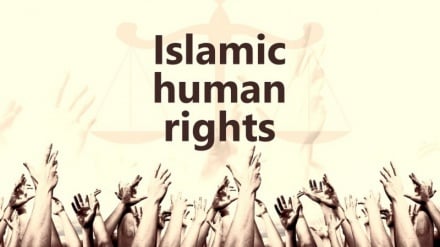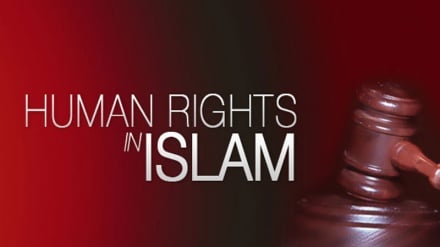Islamic Human Rights (23)
Today, we continue to speak of the status of human dignity in Islamic human rights.
All humans maintain an innate dignity. All human rights are rooted in human dignity. God Almighty in Surat al-Isra points out that Certainly We have honored the Children of Adam. In this ayah, God Almighty refers to the innate dignity of man. Meanwhile, what is the factor within the creation of mankind, which distinguishes him from other creatures and therefore grants him dignity?
Freedom, resolve, and authority are the important pillars of the innate human dignity, which Islamic teachings emphasize. The Prophet of Islam, Mohammad (Blessings of God upon him and his progeny) notes that no one is endeared by God more than human beings.
Meanwhile, mankind has been created with authority. In addition to authority and resolve, all human beings are capable of contemplation. The ability to independently contemplate is embedded in all human beings so that they would realize and set apart ethical and unethical conducts from each other. Mankind with the assistance of his wisdom maintains the capacity to observe and make decisions in a bid to shape his life. Mankind can also compel everyone to respect each other’s rights with setting rules and regulations for the lives of others.
As it was mentioned, the 70th ayah of Surat al-Isra in Holy Quran cites God Almighty as saying: “Certainly We have honored the Children of Adam.”
Ulema and exegetes of Holy Quran realize from this ayah that God has granted honor and superiority to mankind via granting him the ability to contemplate, to make remarks, and to distinguish truthfulness and righteousness from falsehood.
Meanwhile, human dignity is not just embedded in mankind because of his freedom, resolve, authority, and ability to contemplate. It is also because he maintains a divine aspect. In fact, human innate nature mirrors divine traits. Mankind, due to his spiritual innate nature is bonded with the entire universe and thus is the best symbol and manifestation of emergence of divine characteristic traits.
In the teachings of other divine religions, such as Judaism and Christianity, the existence of the divine aspect of man’s innate nature has been emphasized.
Hence, the innate human dignity is an honor granted equally to mankind due to his freedom, resolve, authority, divine aspect, and ability to contemplate. This dignity is an integral part of mankind and imagination of man without it is impossible. As long as mankind exists, he maintains and enjoys human dignity and its related rights.
The Islamic Declaration of Human Rights has on several occasions put emphasis on human dignity and characteristic traits. The prelude to this declaration puts emphasis on human dignity and honor as a divine gift. The first article of this declaration underlines that all mankind equally maintain human dignity. The fourth article of this declaration emphasizes human dignity and points out that men and women equally enjoy and maintain human honor. the eleventh article of this declaration has focused on the freedom of mankind and has pinpointed that no one has the right to enslave, humiliate, and/or oppress another human being.
Human dignity is a privilege that mankind enjoys. The innate honor and dignity of mankind has nothing to do with his belief, race, religion or so forth, such that mankind is not denied of his honor even if he commits a crime, because the actions that mankind takes are set apart from his innate nature. It is the misconduct and misdeed of mankind which is blameworthy and reprehensible; not his innate nature. Hence, those ayahs of Holy Quran which have resembled disbelievers to animals due to their inappropriate usage of eyesight, hearing ability, and power of contemplation, have by no means disregarded such individuals’ innate dignity. These resemblances are solely made because these groups of individuals are only engaged in anger, lust, eating, and sleeping and are unable to understand human life. In fact, these ayahs show that these sorts of individuals have not got beyond the vegetative and animalistic phase of life.
Meanwhile, it should be reminded that animal existence also maintains honor and value; however it maintains a lower level and status in comparison to human life and divine spirit. Mankind can elevate his soul and spirit upon the usage and utilization of his talents. This is because the goal behind creation of the world has been human development. If mankind stoops down to an animalistic level, he would certainly be blameworthy. Thus, the divine religion of Islam considers and treasures an elevated human dignity for mankind based on a number of values, which has been neglected by Western thinkers.
The divine religion of Islam, in addition to the innate honor and dignity of mankind, describes another kind of human dignity which is based on a set of values and is learned and acquired. This type of human dignity is earned and discretionary; and the ultimate value of mankind is in fact tied to this type of human dignity. The earned human dignity is the type of honor which mankind acquires and learns via usage of his talents and innate capacities for attainment of growth, development, and perfection, and acquisition of ethical virtues. In other words, although all equally enjoy and maintain human dignity; however, mankind is capable of achievement of elevation and perfection via application and utilization of his talents. In this manner, the further mankind tries to attain ethical and human growth and elevation; the more superiority he would achieve in comparison to others. How can good humans be in an equal footing to criminals? Are the oppressors and criminals valued the same as those individuals who serve humanity and peace?
The most important criterion of this type of human dignity based on Islamic teachings is piety and faith in God.
God in the 13th ayah of Surat al-Hujurat in Holy Quran notes: “O mankind! Indeed We created you from a male and a female, and made you nations and tribes that you may identify yourselves with one another. Indeed the noblest of you in the sight of Allah is the most God wary among you. Indeed Allah is all-knowing, all-aware.”
Upon consideration of this ayah, a number of conclusions are made. Firstly, race, language, and gender have nothing to do with human dignity, because all humans maintain an innate dignity. In the domain of social rights; all humans, irrespective of their level of faith and piety, enjoy and maintain such rights. Secondly, the type of dignity which can be acquired and earned by mankind can be considered as a criterion of further superiority and privilege of individuals compared to each other on the Day of Judgment. Although in this world, great individuals are also praised, however, the true value and status of these great individuals becomes clear for everyone on the Day of Judgment.
One of the main differences between Islamic and Western human rights is that the Western human rights unfortunately do not distinguish between the two types of human dignity. The negligence of the type of dignity which is acquired and earned by mankind in the Western human rights mainly leads to the downward spiral of human beings and deprives mankind from spiritual growth and development in the contemporary era.
Although the innate human dignity gives rise to a number of rights and obligations for mankind, it cannot lead to development and perfection of mankind, on its own.
Mankind, in order to learn the type of dignity which can be earned by him, should make utmost efforts to purify his soul and to fulfill his personal and social obligations.
MR/ME


